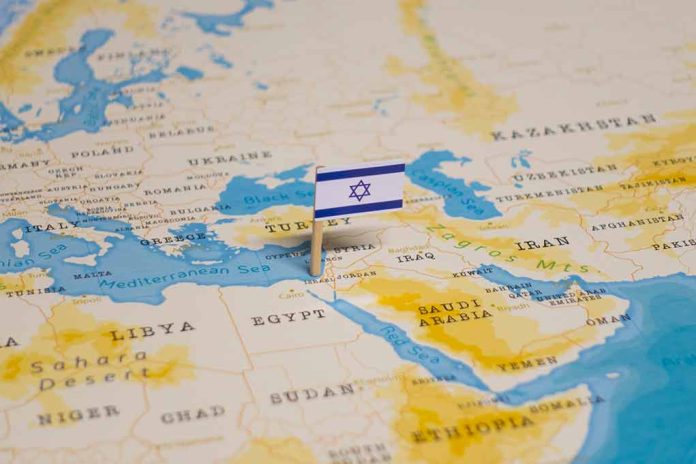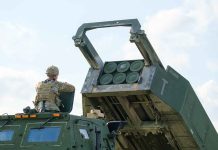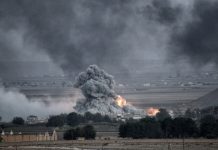
Netanyahu remarks that Israel dismantled 45 years of Iranian warfare infrastructure in just 14 months, reshaping Middle Eastern power dynamics.
At a Glance
- Israel reportedly dismantled Iran’s terrorist infrastructure built over 45 years in just 14 months
- Netanyahu highlights victories against Iranian proxies: Hezbollah, Hamas, and Syrian regime
- Israel aims to establish positive relations with Syria while maintaining strategic positions
- Concerns persist about Iran’s remaining influence and hostages held in Gaza
- Recent Israel-Hezbollah ceasefire brings hope, but regional tensions remain high
Netanyahu’s Bold Claims of Victory Against Iran’s Proxies
Israeli Prime Minister Benjamin Netanyahu has made a striking declaration about Israel’s recent military successes against Iranian-affiliated groups. In a press conference, Netanyahu asserted that Israel had accomplished in just over a year what Iran had spent nearly half a century building. This claim has sent shockwaves through the international community and raised questions about the shifting balance of power in the Middle East.
“Israeli Prime Minister Bibi Netanyahu addressed the press on Monday evening, emphasizing that in just 14 months, Israel had dismantled a terrorist infrastructure that Iran had spent 45 years constructing on Israel’s borders.” – Israeli Prime Minister Bibi Netanyahu Source
Netanyahu’s statements paint a picture of significant Israeli victories against key Iranian proxies, including Hezbollah in Lebanon and Hamas in Gaza. These groups have long been thorns in Israel’s side, receiving substantial support from Iran in terms of weapons, training, and financial backing. The Israeli leader’s claims suggest a dramatic reversal of fortunes for these organizations, potentially altering the strategic landscape of the region.
Strategic Implications for Syria and the Golan Heights
Netanyahu’s revelations extended beyond Lebanon and Gaza, touching on significant developments in Syria. He suggested that Israel’s actions had indirectly benefited Syrian rebel factions, pushing regime forces back towards Damascus. This unexpected turn of events has apparently created new opportunities for Israel in terms of regional strategy and diplomacy.
Of particular note is Netanyahu’s emphasis on the Golan Heights’ strategic importance. The Israeli leader recalled his efforts to secure U.S. recognition of Israeli sovereignty over this disputed territory, underscoring its critical role as a buffer zone. Netanyahu indicated that Israeli forces would maintain their presence in previously demilitarized areas between Israel and Syria, including the strategically vital Mount Hermon.
In a major operational effort, we have thwarted an attack against Israel by the Iranian Quds Force & Shi'ite militias. I reiterate: Iran has no immunity anywhere. Our forces operate in every sector against the Iranian aggression. “If someone rises up to kill you, kill him first.”
— Benjamin Netanyahu – בנימין נתניהו (@netanyahu) August 24, 2019
Persistent Challenges and New Opportunities
Despite the reported successes against Iran’s proxies, Netanyahu acknowledged ongoing challenges. He highlighted the plight of approximately 100 hostages still held by Hamas in Gaza, a situation that continues to weigh heavily on the Israeli public and government. However, the prime minister expressed cautious optimism that Iran’s weakening grip on its proxies might create new opportunities for negotiations and potential breakthroughs.
The recent ceasefire between Israel and Hezbollah in Lebanon has been hailed as a positive development, with UN Secretary-General Antonio Guterres describing it as “the first ray of hope” in the regional conflict. However, the situation remains fragile, with Hezbollah vowing to continue its resistance and support for Palestinians despite the agreement.
“UN Secretary-General Antonio Guterres described the ceasefire as \”the first ray of hope\” in the regional conflict, urging those who signed the ceasefire commitment to respect it fully.” – UN Secretary-General Antonio Guterres Source
A Cautious Path Forward
While Netanyahu’s claims of strategic victory are bold, the reality on the ground remains complex. Iran continues to wield influence through various proxy militias in Iraq and supports Houthi rebels in Yemen, who have launched attacks against Israel. Moreover, reports suggest that Iran is attempting to smuggle weapons into Judea and Samaria, potentially destabilizing the region further.
As Israel navigates these challenges, Netanyahu’s vision for the future includes aspirations for harmonious relations with Syria and a renewed regional order. However, the path to stability remains fraught with obstacles, including ongoing tensions in the West Bank and the ever-present threat of a multi-front conflict. The coming months will be critical in determining whether Israel’s reported successes against Iran’s proxies will translate into lasting peace and security for the region.






















